Have 70% of Landlords Failed to Meet Legal Standards?
While relationships between landlords and tenants can be contentious at times, there are important legal guidelines in place to protect the rights of both parties and point to a resolution - that is, when they are followed correctly.
Under Section 39 of the Deregulation Act 2015, landlords are required to give tenants a copy of the government’s How to Rent guide, which sets out their rights, when they move in. But in a new survey of 559 people, 71.66% (268 people) of respondents who are currently living in rented accommodation say that their landlord did not give them a copy of the How to Rent guide, whether in physical form or by email. While this may seem insignificant, it could affect a landlord’s ability to later evict the tenant, making it a fundamental legal responsibility.
There was similar concern among renters about deposits. Section 213 of the Housing Act 2004 states that, within 30 days of receiving a deposit from a tenant under an assured shorthold tenancy agreement, a landlord must place it in one of three approved tenancy deposit schemes. In our survey, 45.19% (169 people) said their landlord has not protected their deposit or given them information about the deposit protection scheme they have used - also a legal requirement. This could put landlords in a risky position when it comes to the end of a tenancy.
Of the respondents who said that they had not received a How to Rent guide or had their deposits protected, 64% said that their property did not have an energy performance certificate either - a third legal requirement that these landlords are failing to meet. This represents 16.5% of all respondents whose landlords have failed to fulfil multiple key obligations.
For landlords, this should act as a clear warning. By missing these key legal responsibilities, you open yourself up to the risk of legal trouble, and reduce the options they can take in response.
How do tenants feel about their landlords?
A tenant’s relationship with their landlord is based on trust, and these legal concerns could be a threat to that trust. However, our survey indicated that tenants have largely positive relationships with their landlords, with an average rating across all respondents of 3.6 out of 5. Even among people who did not receive the How to Rent guide or have their deposit protected, the average rating was 3.4 out of 5, representing a largely positive relationship.
Of all the respondents, 55% said they had a positive relationship with their landlord. Only 4% said they have an exclusively negative relationship with their landlord, compared with 19.25% who said that the relationship is always positive.
This may reflect that there is a general lack of awareness among tenants about their legal rights and their landlord’s responsibilities. It may also have helped that these landlords met other key priorities for tenants. In order of importance, tenants ranked that making repairs quickly, communicating well, and offering low rent are the qualities they preferred in a landlord. 90% of landlords have never entered the tenant’s property without giving notice, which is both a legal requirement and something that tenants would prefer.
How common are landlord and tenant disputes?
Disputes are relatively rare, with only 17% of respondents reporting that they had experienced a falling out - whether as the landlord or the tenant. Disputes were most commonly caused by repairs (50%), rent (24%), and noise complaints (15%). It may not be surprising to see that 76% of tenants who have been in a dispute with a landlord said that the problem was the landlord's fault, while 86% of landlords who had been in a dispute said the problem was the tenant's fault.
When disputes arise, they are most commonly resolved by tenants moving out - in fact, 39% of all the disputes that were reported as having been resolved ended in this way. Only 15% of those involved in disputes sought legal advice, which could explain why respondents reported little concern over serious failures on their landlord’s part.
Find the full results of our survey below, or find out more about a landlord’s legal obligations from the experts at Percy Hughes & Roberts Solicitors.
Percy Hughes & Roberts' Landlord Survey: the Results
1. Have you ever lived in a rented home?
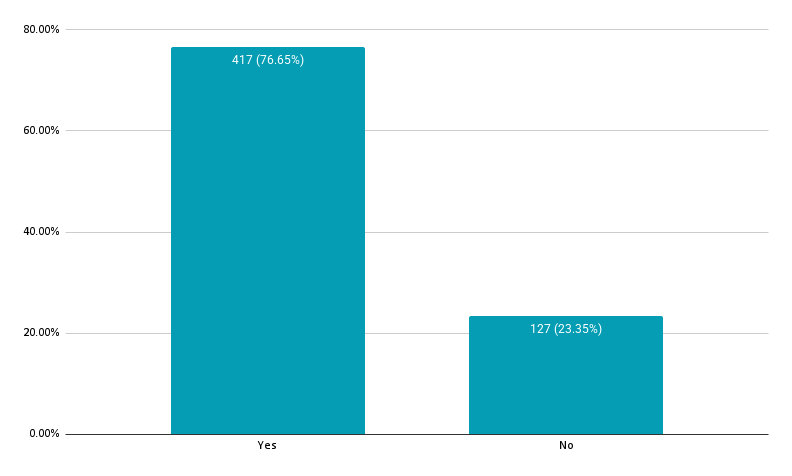
| Responses | ||
|---|---|---|
| Yes | 417 | 76.65% |
| No | 127 | 23.35% |
2. How is your relationship with your landlord?
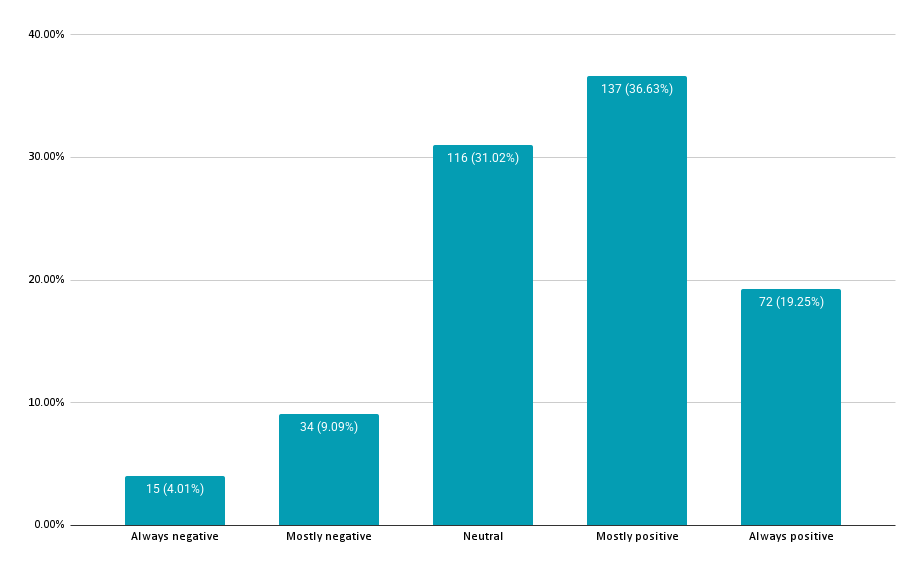
| Responses | ||
|---|---|---|
| Always negative | 15 | 4.01% |
| Mostly negative | 34 | 9.09% |
| Neutral | 116 | 31.02% |
| Mostly positive | 137 | 36.63% |
| Always positive | 72 | 19.25% |
3. Has your landlord protected your deposit in a deposit protection scheme and given you the relevant details?
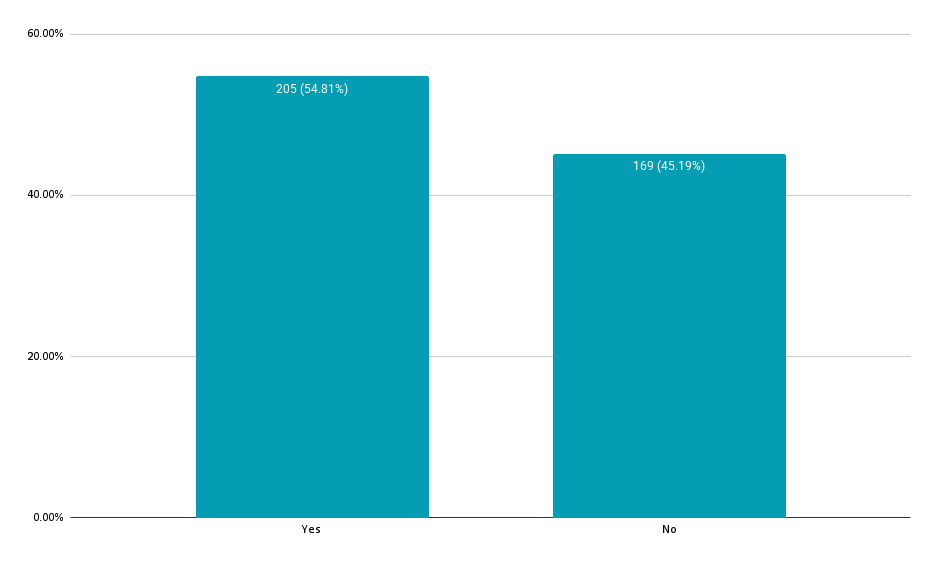
| Responses | ||
|---|---|---|
| Yes | 205 | 54.81% |
| No | 169 | 45.19% |
4. Did you receive a copy of the government’s How to Rent guide when you moved in?

| Responses | ||
|---|---|---|
| Yes | 106 | 28.34% |
| No | 268 | 71.66% |
5 Does your property have an energy performance certificate?
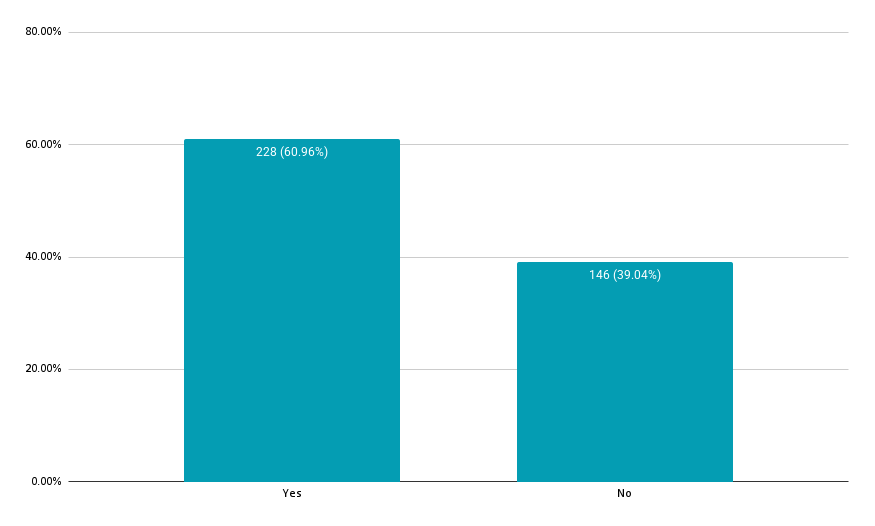
| Responses | ||
|---|---|---|
| Yes | 228 | 60.96% |
| No | 146 | 39.04% |
6 Does your property have a gas safety certificate?
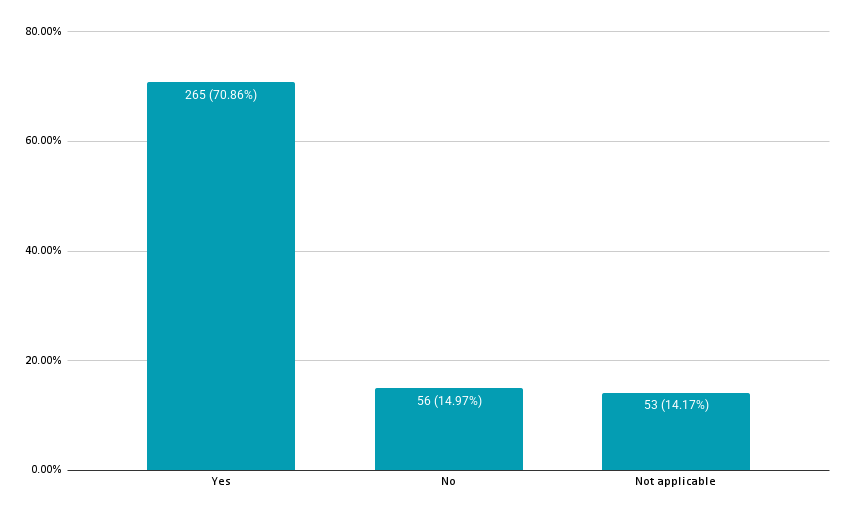
| Responses | ||
|---|---|---|
| Yes | 265 | 70.86% |
| No | 56 | 14.97% |
| Not applicable | 53 | 14.17% |
7 Has your landlord ever entered your property without giving you notice?

| Responses | ||
|---|---|---|
| Yes | 39 | 10.43% |
| No | 335 | 89.57% |
8 Have you ever been in a dispute with your landlord?
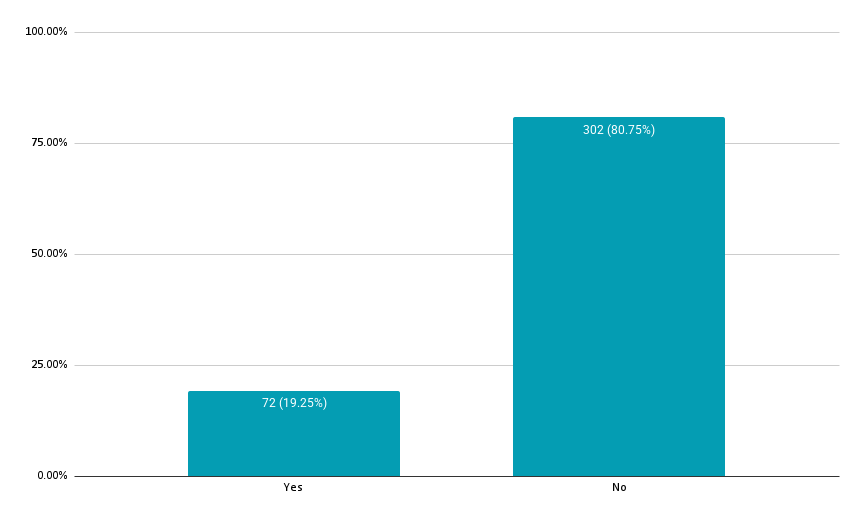
| Responses | ||
|---|---|---|
| Yes | 72 | 19.25% |
| No | 302 | 80.75% |
9 What was the dispute about?
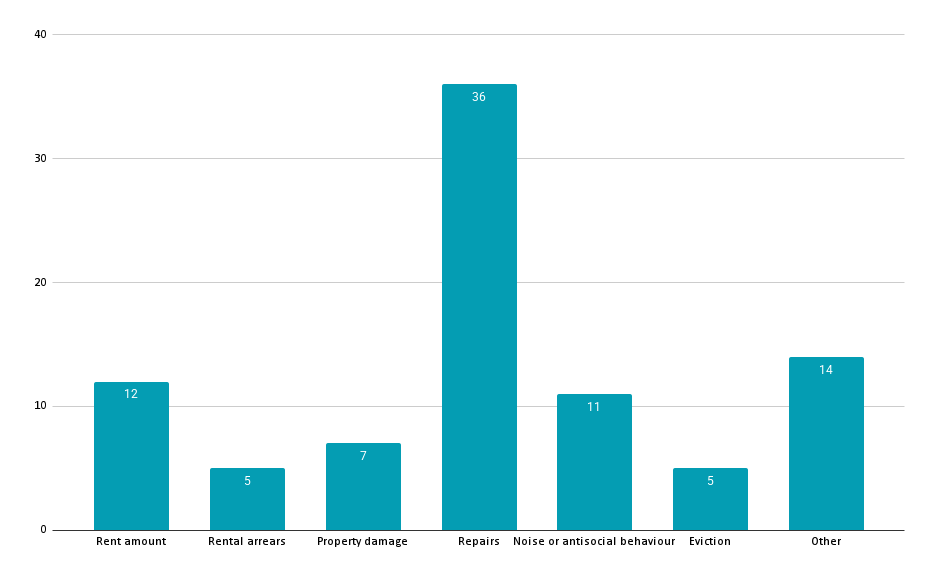
| Responses | ||
|---|---|---|
| Rent amount | 12 | 16.67% |
| Rental arrears | 5 | 6.94% |
| Property damage | 7 | 9.72% |
| Repairs | 36 | 50.00% |
| Noise or antisocial behaviour | 11 | 15.28% |
| Eviction | 5 | 6.94% |
| Other | 14 | 18.06% |
10 Who was at fault?
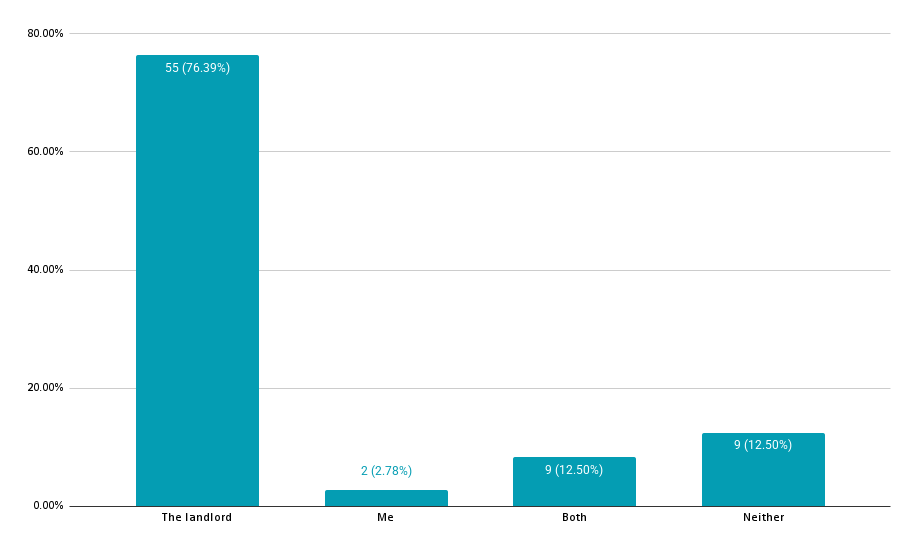
| Responses | ||
|---|---|---|
| The landlord | 55 | 76.39% |
| Me | 2 | 2.78% |
| Both | 6 | 8.33% |
| Neither | 9 | 12.50% |
11 How was the dispute resolved?
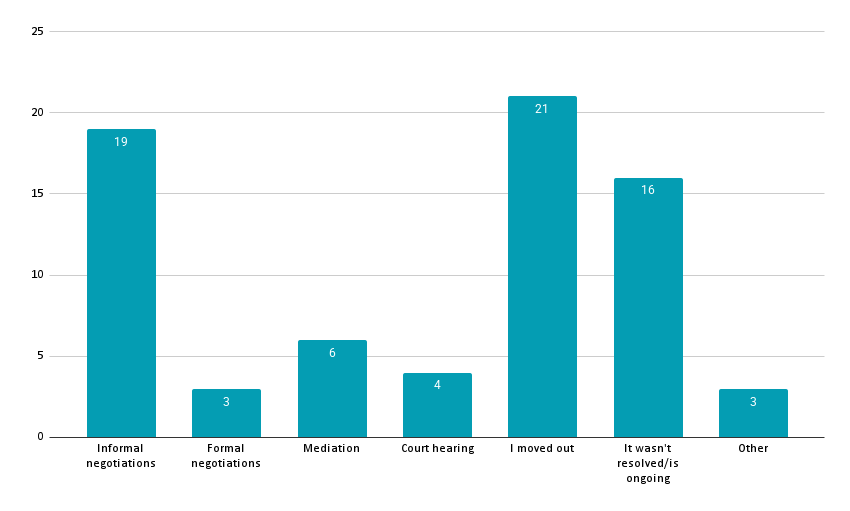
| Responses | ||
|---|---|---|
| Informal negotiations | 19 | 26.38% |
| Formal negotiations | 3 | 4.17% |
| Mediation | 6 | 8.34% |
| Court hearing | 4 | 5.55% |
| I moved out | 21 | 29.17% |
| It wasn't resolved/is ongoing | 16 | 22.22% |
| Other | 3 | 4.17% |
12 Did you seek legal advice for support in your dispute?
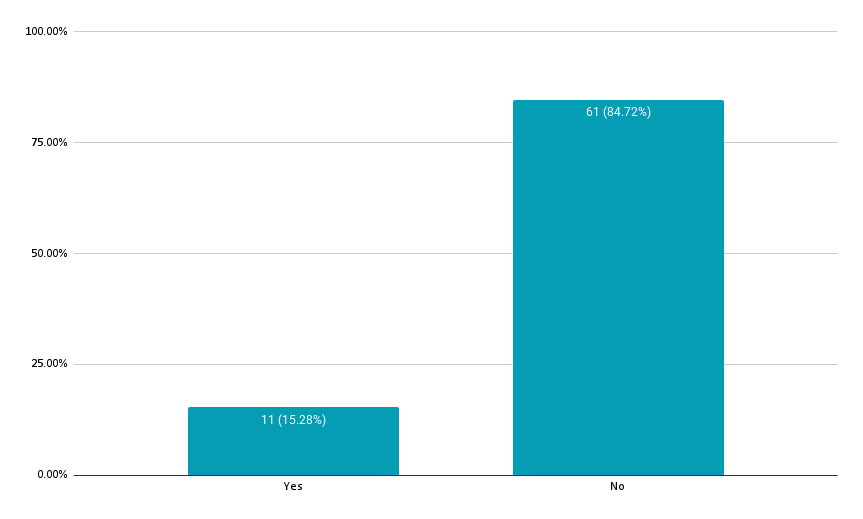
| Responses | ||
|---|---|---|
| Yes | 11 | 15.28% |
| No | 61 | 84.72% |
13 Rank these qualities of a landlord in order of importance
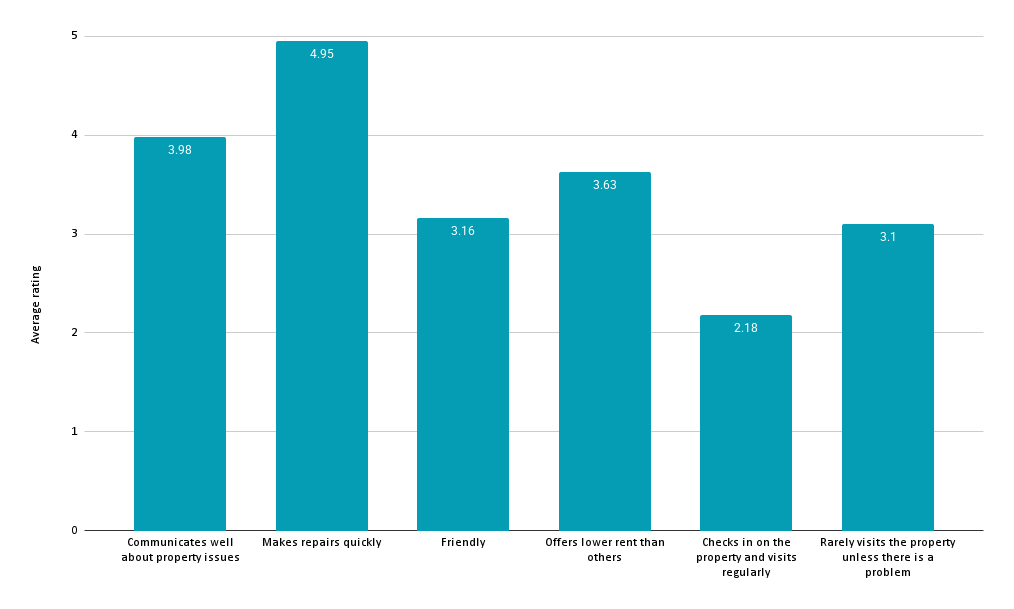
14 To what extent do you agree with the following statements?
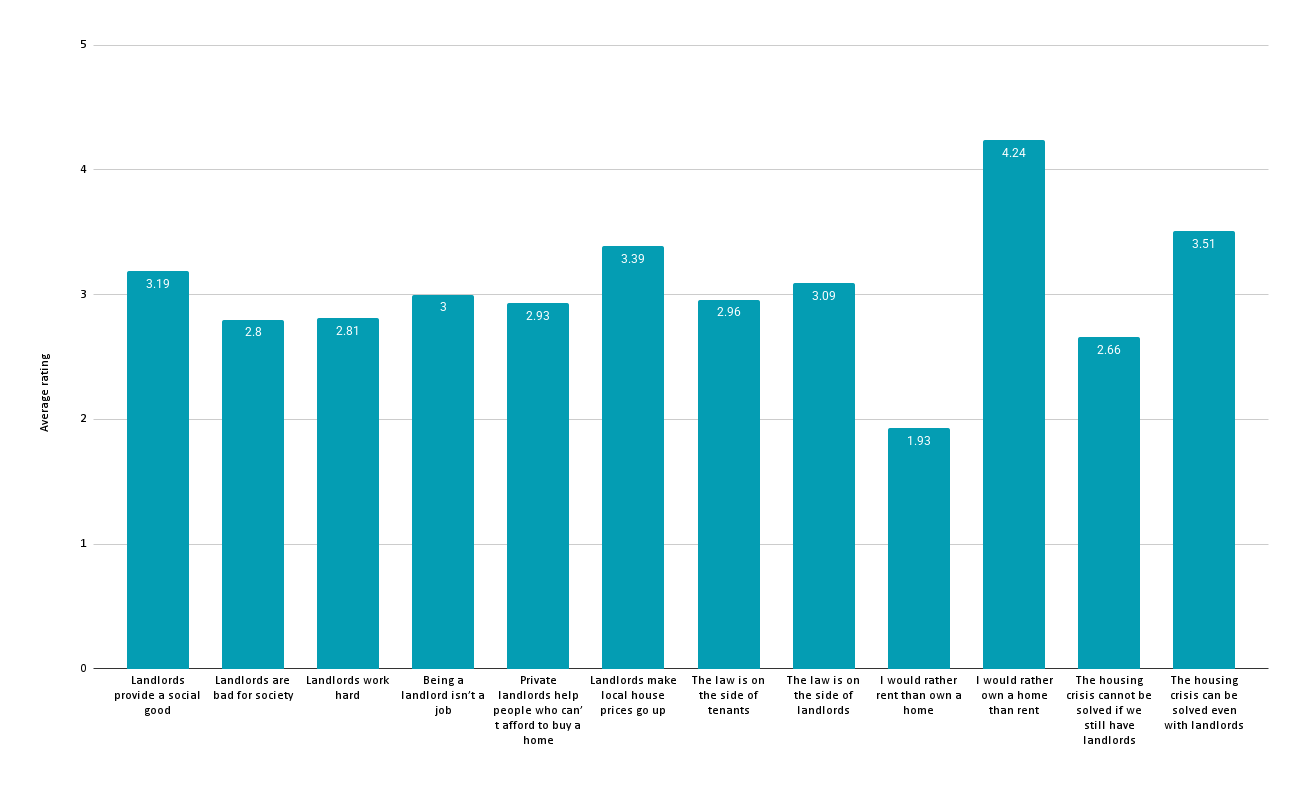
| Strongly disagree | Slightly disagree | Neither agree nor disagree | Slightly agree | Strongly agree | ||||||
|---|---|---|---|---|---|---|---|---|---|---|
| Landlords provide a social good | 8.09% | 28 | 12.72% | 44 | 40.17% | 139 | 29.77% | 103 | 9.25% | 32 |
| Landlords are bad for society | 14.53% | 50 | 23.55% | 81 | 35.76% | 123 | 19.48% | 67 | 6.69% | 23 |
| Landlords work hard | 12.14% | 42 | 21.97% | 76 | 43.35% | 150 | 17.92% | 62 | 4.62% | 16 |
| Being a landlord isn’t a job | 9.71% | 33 | 28.53% | 97 | 27.94% | 95 | 19.71% | 67 | 14.12% | 48 |
| Private landlords help people who can’t afford to buy a home | 17.01% | 58 | 15.25% | 52 | 33.43% | 114 | 26.10% | 89 | 8.21% | 28 |
| Landlords make local house prices go up | 4.96% | 17 | 9.91% | 34 | 40.52% | 139 | 30.32% | 104 | 14.29% | 49 |
| The law is on the side of tenants | 12.32% | 42 | 19.06% | 65 | 36.95% | 126 | 23.46% | 80 | 8.21% | 28 |
| The law is on the side of landlords | 8.14% | 28 | 20.06% | 69 | 40.12% | 138 | 17.73% | 61 | 13.95% | 48 |
| I would rather rent than own a home | 55.69% | 191 | 13.99% | 48 | 16.62% | 57 | 9.04% | 31 | 4.66% | 16 |
| I would rather own a home than rent | 4.37% | 15 | 4.66% | 16 | 14.29% | 49 | 15.45% | 53 | 61.22% | 210 |
| The housing crisis cannot be solved if we still have landlords | 16.57% | 57 | 26.45% | 91 | 36.92% | 127 | 14.53% | 50 | 5.52% | 19 |
| The housing crisis can be solved even with landlords | 3.79% | 13 | 7.87% | 27 | 37.90% | 130 | 34.40% | 118 | 16.03% | 55 |
15 As a landlord, have you ever been in a dispute with a tenant?
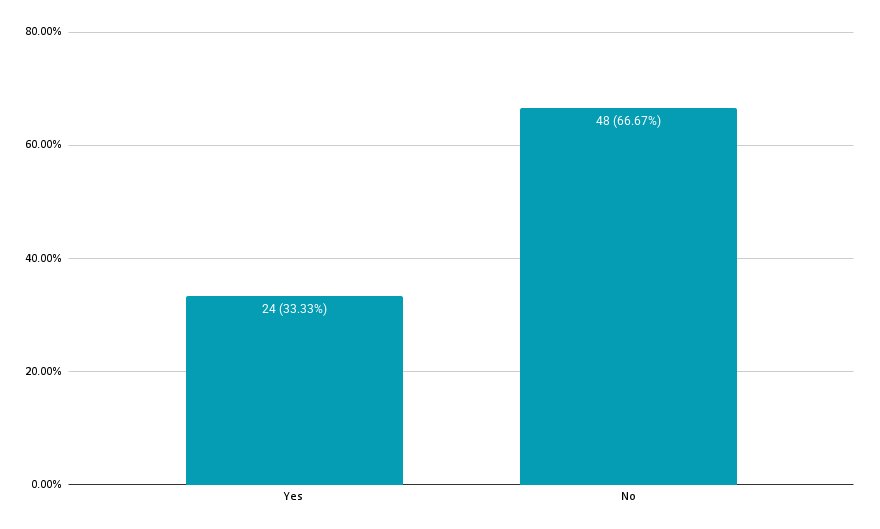
| Responses | ||
|---|---|---|
| Yes | 24 | 33.33% |
| No | 48 | 66.67% |
16 What was the dispute about?
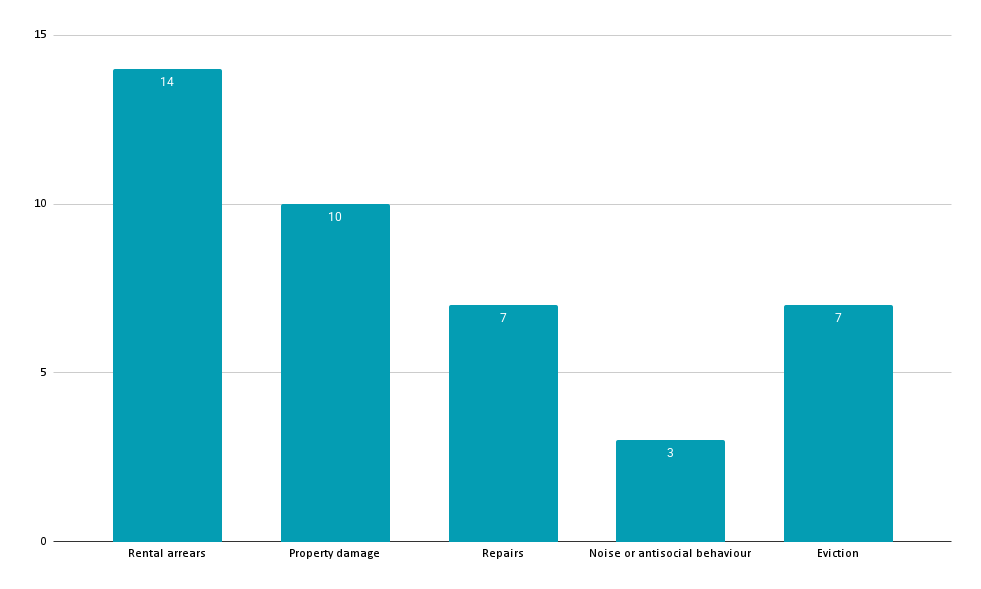
| Responses | |
|---|---|
| Rental arrears | 14 |
| Property damage | 10 |
| Repairs | 7 |
| Noise or antisocial behaviour | 3 |
| Eviction | 7 |
17 Who was at fault?
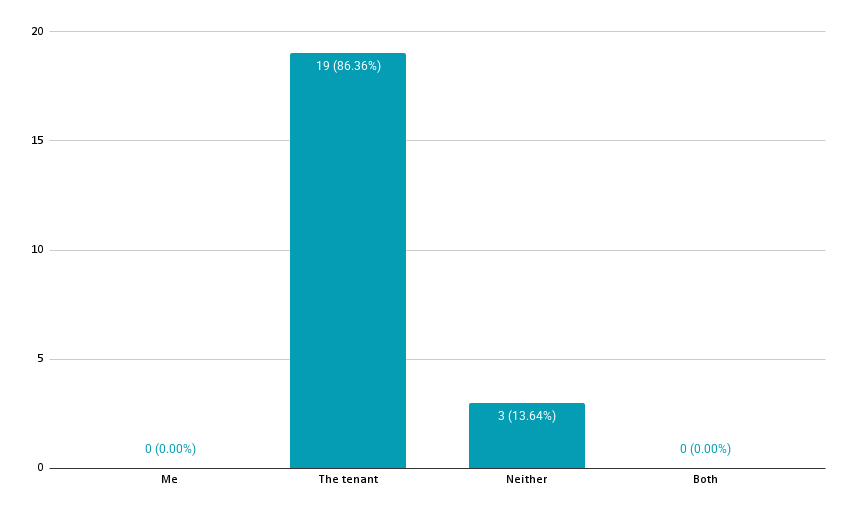
| Responses | ||
|---|---|---|
| Me | 0 | 0% |
| The tenant | 19 | 86.36% |
| Neither | 3 | 13.64% |
| Both | 0 | 0% |
18 How was the dispute resolved?
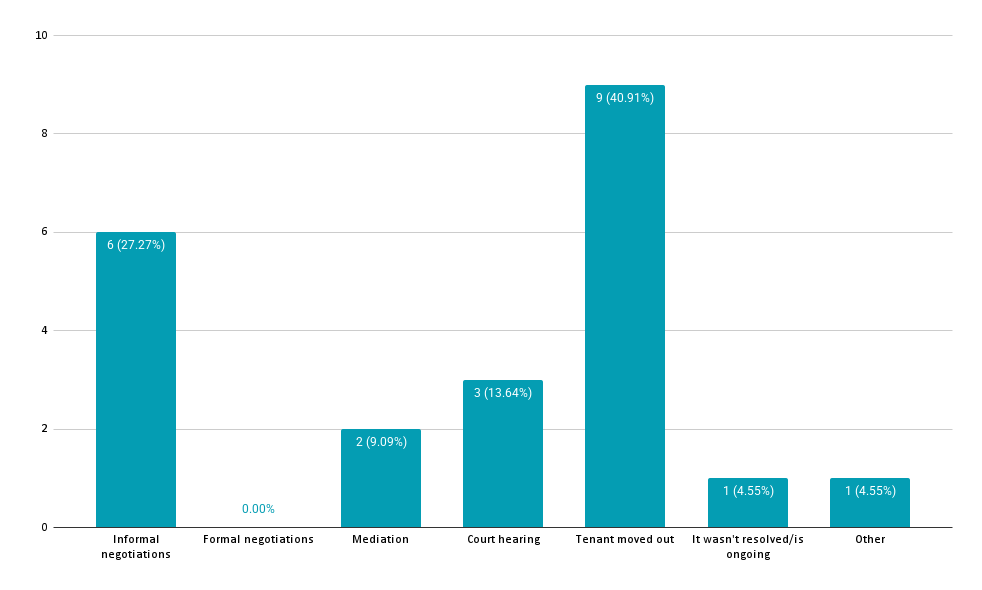
| Responses | ||
|---|---|---|
| Informal negotiations | 6 | 27.27% |
| Formal negotiations | 0 | 0.00% |
| Mediation | 2 | 9.09% |
| Court hearing | 3 | 13.64% |
| Tenant moved out | 9 | 40.91% |
| It wasn't resolved/is ongoing | 1 | 4.55% |
| Other | 1 | 4.55% |










